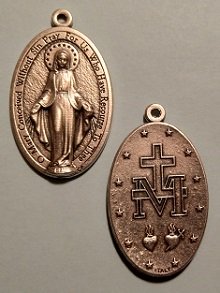Alms for the Poor
How to Help the Poor
Alms for the Poor, also known as almsgiving, is one of the most overlooked of the three principal Lent activities we participate during the Lenten season. Probably, because it hits us where it hurts the most - our pocketbooks.
Jesus spoke on these three things - alms, prayer, and fasting - in Matthew chapter 6, verses 1 - 18, in his first public teaching, known as the Sermon on the Mount. (Matthew 5-7)
In this section, we will be discussing almsgiving.
Importance of Almsgiving
A wise old pastor told me years ago, that greed is the sin of the world. Greed is an evil. The love of money (greed) is the root of all evil.(1 Timothy 6:10) That's because it, and the sin of pride - which is the source of all evil - focuses on selfishness instead of sharing.
To counteract the evil of greed, it is necessary for us to learn how to give, and give wisely - not just to pacify a guilty conscience.
He said if people would share their money, there would be no famines. Notice, he did not say share their food. It can be easier to give food and clothes, but often harder to give money. Sometimes that can really hurt.
Over the years, I've come to see the truth of what this old pastor told me. I once heard that there was a study done, that all the famines in the last 500 years were engineered by the greed and tyranny of people.
A Gospel Story - What Jesus told the Pharisees
In the Gospel of Luke (11: 37 - 41), we find that Jesus had been invited to eat at a Pharisee's house.
The Pharisee was "shocked" that Jesus did not do the hand-washing ritual before eating.
Jesus courageously told him the truth:
"You Pharisees are so careful to clean the outside of the cup and the dish, but inside you are still filthy - full of greed and wickedness. "Fools! Didn't God make the inside as well as the outside? "So give to the needy what you greedily possess, and you will be clean all over."
As proof that the Pharisees and religious leaders were greedy, they were even using the temple as a place to buy and sell and change money.
When Jesus cleaned out the area with a whip, and kicked over the money changing tables, he said:
"My house is a house of prayer, but you have made it a den of thieves." (Matthew 23:13; Mark 11:17; Luke 19:46)
So we find that almsgiving is a powerful way to make reparation for sin, and bring God's grace into our hearts and souls.
Another Gospel Story - The Tax Collector
Zacchaeus was a tax collector. He was a very rich man. But he was a bit short - both inside and outside.
Many people hated tax collectors, because they worked for the foreign occupation government (Rome), and many tax collectors were stealing money by charging more than the right amount of tax, and then keeping the difference.
One day, Jesus came to town, and Zacchaeus wanted to see Jesus, but there was a big crowd, and he was too short, so he couldn't see him. So he ran ahead and climbed a sycamore tree beside the road so he could watch from there.
When Jesus came by, Jesus looked up at Zacchaeus, called him by name, and said, "Zacchaeus! Quick, come down! For I must be a guest in your home today."
With great excitement and joy, Zacchaeus climbed down and took Jesus to his house.
But the crowd was not happy. They grumbled that Jesus had gone to be the guest of a notorious sinner.
But Zacchaeus stood there and said to Jesus,
"I will give half my wealth to the poor, Lord, and if I have overcharged people on their taxes, I will give them back four times as much!"
Jesus then said to those present:
Today salvation has come to this home, for this man has shown himself to be a son of Abraham. And I, the Son of Man, have come to seek and save those like him who are lost.
How to Help the Poor
Sometimes, we do not have money. We can still give our energy, time, talent, and other resources. In fact, sometimes the very job we do is helping the poor, such as a nurse working in a hospital, a teacher teaching, a farmer hiring workers, and many other ways.
Sometimes, the best way to help a poor person is to help them get a job.
Alms for the Deserving Poor
But we must give wisely.
There are some people that cannot handle money. An example would be, someone on the street who would take the money and go buy alcohol or cigarettes.
In that case, it would be better to go purchase the food yourself, and then give them the food - or the clothes, or whatever they need. Or, to give it to a worthy charity, which manages their resources wisely, and effectively helps the poor.
Then there are some people who look poor, and say they're poor, but they are really lazy. They don't want to work. In that case, they need to learn the lesson of Paul the Apostle, that if they don't work, they should not eat. (2 Thessalonians 3:10)
Beware of Criminals
Above all, we must be aware of fallen human nature and it's inclination to sin. To be specific, I'm talking about criminals.
Just because we are helping the poor, does not mean we should forget common sense. In fact, God expects us to keep alert, to be wise as serpents, yet simple as doves. (Matthew 10:16)
There are some people who will take your money, and continue to commit crimes. They will take advantage of your charity, and "stab you in the back." For example, you may want to help someone in a broken down vehicle, you may want to help a hitch hiker. But unless you are certain of the situation, truly capable of helping, able fully to protect yourself, and have companions to help you, then don't put yourself or your family in danger. Get the proper authorities to do it. Some criminals are waiting to rob you and do worse to you.
In such situations, be on your guard and stay on your guard. It's better to be safe than sorry.
There are many, many "charitable" scams, who are ready to steal your money and/or your identity.
It is up to you to do your due diligence.
What Happened to One Pastor
One day an older man knocked on the rectory door, asking the pastor for money to eat.
The pastor was poor. He asked the man at the door if he could eat some beans, some rice. The man started giving excuses. The man then said he wanted to do laundry, and that would require money.
The pastor gave the man $20, telling him this was about all the money he had, and that it was literally his food and gas money for weeks.
At that time, the pastor was looking for a wood stove, because he couldn't afford the gas heat. He asked him if he knew where he could find one. The man gave the pastor the address of a friend, way across town. So the pastor went there. It was an apartment. Some people answered. They did not have a stove, and didn't recognize the name of the man.
Months later, the man came back to the pastor, asking for more money. He said it was his anniversary, he wanted to take his wife to dinner, etc.
The pastor told him that he couldn't even afford to go out and eat at restaurants at all. Then the pastor told him how he had stood the pastor up and lied to him, and how he had driven across town and wasted gas and time because of his lying.
The poor man went completely red in the face, and turned around without another word, and walked out. The pastor never saw him again.
The pastor was thankful that the Holy Spirit had guided him how to handle this situation.
The Importance of Prudently Giving Alms
The pastor's effort to check out the man's story paid great dividends. Because once you're found out to be a "softy", these "friends" will start getting the word out, and you can end up with a whole bunch of con-artists at your door.
Which was exactly what was happening to other churches in the same city at that time. The churches started contacting one another, and put stories together, and were working on a coordinated system of accountability, because they found out that some people were going to different churches with their "stories" and making thousands of dollars a month.
Many of them were making more in a month than the pastor would see in a year.
Such people need a good dose of reality - and maybe even prison - before they can understand the crimes they are committing and their need of repentance - else they risk going to hell.
We pray God forgive them - and that they pay back what was gotten wrongfully. Because in matters of restitution, God can forgive when there is the intention and effort to return what was stolen. (Matthew 5:26; Luke 12:59)
A Warning for Parents Also
These warnings also go for parents (and grandparents, and other relatives and friends) of children, especially adult children, who use money for drugs, alcohol, or other crimes, or to support a lazy lifestyle.
This is not true charity.
Parents who continually bail out such children with money, shelter, or sympathetic support can actually be accomplices in the sins of such a child, and share the guilt with them, because they are enabling him or her to continue living a Godless lifestyle.
They are actually interfering with God's work, because they prevent such a child from suffering the consequences of their actions that God intends for them in this life, and so they only worsen what could be their consequences both in this life and in the next.
Teach your Children Work
Doing work diligently and honestly is a lesson that parents need to be teaching their children, else we will end up with a selfish generation, from "give me, give me" to "you owe it to me" to "I'll kill you over a quarter."
Parents who don't teach their children to put in honest work for honest pay, will find themselves in much grief, especially as they get older, and are left lonely and forsaken if not robbed and destitute by their children.
In my commentary on fasting, I explain that the chief sacrifice God wants in people today is to do their daily duty, their work and their chores, well.
Alms for the Poor Requires a Work Ethic
Paul the Apostle writes that those who used to steal, should work with their own hands, so that they may have something to give to those in need. (Ephesians 4:28)
In other words, almsgiving may require a bit of elbow grease. For many of us, almsgiving is a sacrifice.
Lent is a good time to examine ourselves how we are doing in the area of taking care of God in the poor. It's how we are going to be judged when we die. How we treat the poor will decide our eternal destiny, because Jesus said what you do to the least of the brethren, you do to me. (Matthew 25:40, 46)
The Apostle Paul Teaches on Almsgiving
After his conversion, the apostle Paul traveled to many countries, bringing the gospel, the good news of salvation. He supported his missionary work by working as a tent maker. (Acts 18:3)
He did not want to be a burden on other people. (1 Corinthians 9:4-15)
But the time came there was a famine in Jerusalem. He wrote a letter to the Corinthians asking support. In it we find many lessons on the blessings of almsgiving. (1 Corinthians ; 2 Corinthians chapters 8-9) And that God loves a cheerful giver. (2 Corinthians 9:7)
Bad Motives in Giving Alms for the Poor
We should never give alms to show off or to look good.
In his first public teachings, Jesus warns that we should give our alms in secret, so we can receive the heavenly reward. (Matthew 6:4)
Later, we read that in the early church a couple sold some property and gave some of the money to the leaders, but told them it was all of the money. They lied, and because they lied to the church, which takes the place of God, they both dropped dead – and fear fell on all of the church. (Acts 5:1-14)
Good Motives in Giving Alms for the Poor
The best motive is the motive of true charity, coming from the heart, but which really comes from God dwelling within us, because anything good in us, especially supernatural charity, is a gift from God.
St. Paul writes a wonderful dissertation on charity. (1 Corinthians 13:1-13)
He says if I deliver my body to be burned, and I do all of these wonderful and heroic things, and make all the sacrifices, and feed the poor – but don't have charity – it is useless, I am worthless.
Have you seen an empty tin can rattling down the road? It makes a lot of noise, but still it is empty.
That's what happens when you do a lot of things, but don't have true charity.
Where's the Payback for Alms for the Poor
Sometimes, people wonder why they give so much, and see nothing in return. Like
- Where's the payback?
- Where's all the blessings we're supposed to receive?
- Why am I still having so many problems?
Lenten Check-up on Alms for the Poor
To answer these questions, let us remember first of all that God will not be outdone in generosity. He will reward us in eternity, with blessings we cannot begin to imagine.
Lent is a good time to examine ourselves, how and why we give alms for the poor:
- God reigns, God is sovereign, maybe he has lessons for you that are more important than our getting what you expect.
- God may be waiting for you to have a better attitude, maybe your motives are wrong.
- God loves a cheerful giver (2 Corinthians 9:7) - maybe you are giving stingily out of duty, rather than genuine charity.
- Maybe you're not supposed to be figuring out how much you've been giving. (Matthew 6:3)
- God's blessings may come to you in many different ways than you expect.
- Maybe the causes you are giving to are not pleasing to God. Maybe the church or charity you support is not fulfilling God's purposes. God expects us to use reasonable diligence and wisdom when giving alms to the poor. He wants us to make sure that we are being good stewards of the resources he has given us. Jesus complains that the children of this world are wiser in their generation than the children of the light. (Luke 16:8)
- Maybe someone is supporting a charity to save the animals, but neglecting God's own children.
- Maybe your "charity" is enabling another person to continue a worldly and sinful lifestyle
- Maybe a major unrepentant sin is blocking God's blessings. For example, a person gives to generous causes, but holds that abortion is perfectly okay, either in practice, or as a speaker or politician. God may withhold his blessings out of true love to discipline an individual, especially when a matter of justice, such as the right to life, which belongs to God and he has given to another person, is being seriously violated, especially when that person is innocent and cannot defend themselves. (Proverbs 24:11-12)
- Maybe you're too involved in getting the benefit - such as a tax deduction - than doing it from a generous and loving heart.
- God has many blessings waiting for us when we give alms for the poor. It's like the seed in the Gospel, but it will only bear fruit in good soil - in a good and generous heart. (Luke 8:15)
Go to What is Lent - Poems, Activities, and Special Days of the Lenten Season.
Go to Home Page.
© Copyright 2010 - 2026 Thank-Your-Stars.com








